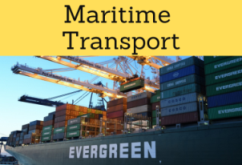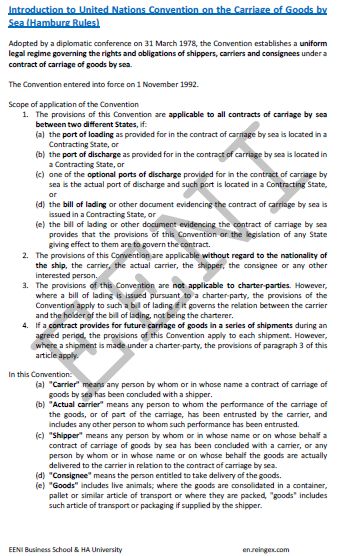Hamburg Rules, Carriage of Goods by Sea
Convention on the Carriage of Goods by Sea, Hamburg Rules, Bill of Lading

The United Nations Convention on the Carriage of Goods by Sea (Hamburg Rules) defines a legal framework for contracts for international maritime transport of goods between two or more countries.
Under the Hamburg Rules, the obligations and rights of logistics agents are clearly specified: consignees, porters and stevedores.
The UN Convention on the Carriage of Goods by Sea (the Hamburg Rules) came into force in 1992.
The document used is the Bill of Lading (it can be presented electronically).
- Introduction to the UN Convention on the Carriage of Goods by Sea (Hamburg Rules)
- Main characteristics of the Hamburg Rules
- Responsibilities of the carrier and shipper
- Loads on covers
- Transportation document (Bill of Lading)
- Claims and actions. Losses and damages
- Background of the Hamburg Rules: The Hague Rules
United Nations Convention on the Carriage of Goods by Sea (Hamburg Rules):


The Subject “United Nations Convention on the Carriage of Goods by Sea (Hamburg Rules)” is included within the curriculum of the following academic programs at EENI Global Business School:
Logistics Courses: Maritime transport, Multimodal, Transport and Logistics in Africa.
Certificate in International Transport

Masters: International Transport, International Business, Foreign Trade.


Languages: 
 Reglas de Hamburgo
Reglas de Hamburgo
 Règles of Hambourg
Règles of Hambourg  Regras of Hamburgo.
Regras of Hamburgo.
Carrier's liability: from the moment that he receive the goods (under
his custody) in the cargo port, during the transport phase to the port of
discharge.
Organism: United Nations Commission on International Trade Law (UNCITRAL).
Member countries of the UN Convention on the Carriage of Goods by Sea (Hamburg Rules): Albania, Austria, Barbados, Botswana, Brazil, Burkina Faso, Burundi, Cameroon, Czech Republic, Chile, Democratic Republic of the Congo, Dominican Republic, Denmark, Ecuador, Egypt, Finland, France, Gambia, Georgia, Ghana, Germany, Guinea, Holy See, Hungary, Jordan, Kazakhstan, Kenya, Lesotho, Lebanon, Liberia, Madagascar, Malawi, Morocco, Mexico, Nigeria, Norway, Pakistan, Panama, Paraguay, Philippines, Portugal, Slovakia, Syria, Tanzania, Romania, Saint Vincent and the Grenadines, Senegal, Sierra Leone, Singapore, Sweden, Tunisia, Uganda, U.S., Venezuela, Zambia.
Containers and Transportation(c) EENI Global Business School (1995-2025)
Top of this page










 WhatsApp
WhatsApp